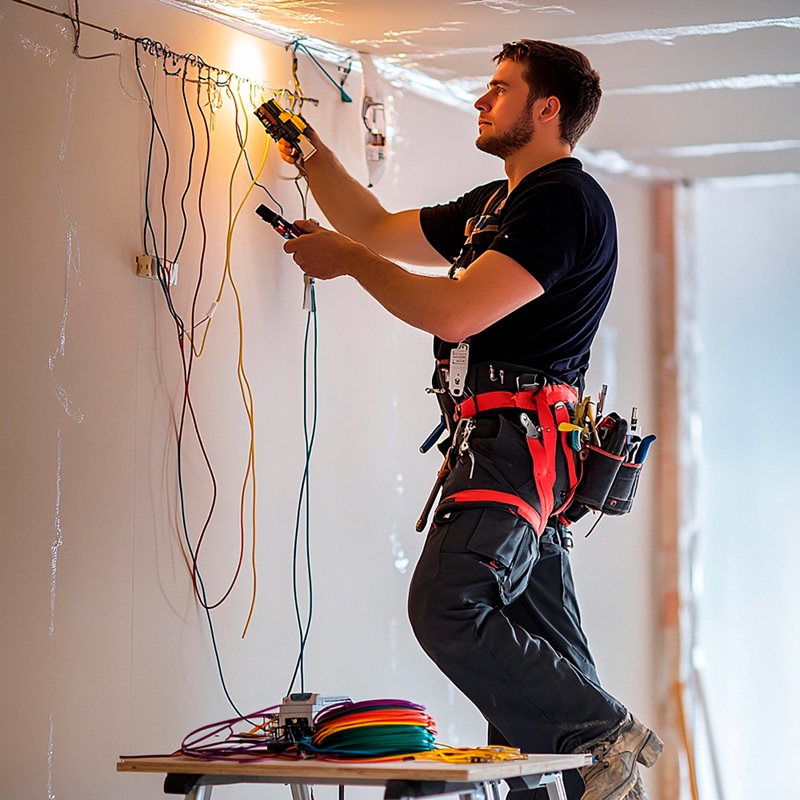Home rewiring is one of the most impactful home improvement projects, significantly improving your home’s safety, energy efficiency, and overall value. Whether you’re addressing outdated wiring or upgrading to meet the demands of modern appliances, the rewiring process requires careful planning. Ensuring that the job is completed efficiently, safely, and within your budget hinges on proper preparation.
Why Rewiring Is Crucial for Safety and Modern Power Needs
Rewiring is essential for homes that still have outdated electrical systems. In older homes, wiring systems like knob-and-tube (common in homes built before the 1940s) may not meet modern safety standards and can wear down over time. As electricity demand increases with new devices—home theaters, electric vehicles, and high-power appliances—older systems can no longer handle the load. This could lead to serious issues like circuit overloads, tripped breakers, and even electrical fires.
Key Benefits of Home Rewiring:
- Increased Safety: Modern wiring systems are designed to prevent fire hazards and other safety issues.
- Improved Energy Efficiency: Upgrading to energy-efficient systems can lower your electricity bills.
- Enhanced Capacity: New wiring ensures your home can handle the electrical needs of today’s devices.
Why You Should Hire a Professional Electrician for Home Rewiring
While DIY rewiring may seem like an attractive option to save costs, electrical work is dangerous and requires specific expertise. Mishandling electricity can cause severe accidents, including electric shocks, fires, and even fatalities. This is why it’s essential to hire a licensed electrician who is trained, insured, and up to date with local safety codes.
A professional electrician ensures that the rewiring is done safely, meets all local codes, and minimizes risks. They also have the necessary tools, knowledge, and insurance to address potential issues efficiently. If something goes wrong, you are protected with liability coverage, which would not be the case with a DIY project.
Assess Your Home’s Electrical Needs
Before starting your rewiring project, it’s important to assess both your current and future electrical needs. New appliances, electronics, and home upgrades often increase electrical demands. For example, adding a hot tub, upgrading kitchen appliances, or installing a home theater system might require dedicated circuits.
Questions to Ask:
- Are you adding any new high-power appliances?
- Do you plan to upgrade your home’s heating or cooling system?
- Will you be installing additional outlets or circuits?
Discuss these needs with your electrician to ensure your rewiring project accommodates future growth, preventing the need for costly upgrades later.
Preparing Your Home for Rewiring
Proper preparation before your rewiring job begins can help streamline the process and reduce disruption. Here are a few steps to make the process smoother:
- Clear Work Areas:
Remove heavy furniture and any obstructions near areas where rewiring will take place. This gives your electrician easier access to circuit panels, outlets, and light switches. - Protect Floors and Carpets:
Cover floors and carpets with drop cloths or plastic sheeting to prevent dust and debris from spreading throughout your home. - Ensure the Power is Turned Off:
Before work begins, confirm that the main breaker is switched off in the affected areas. Your electrician will do this, but it’s always best to double-check.
Plan for Potential Disruptions
Rewiring your home can take several days or even weeks depending on your home’s size and the complexity of the work. The project might involve temporary power outages and some rooms may be inaccessible. Discuss the expected timeline with your electrician, and make any necessary arrangements for alternate living arrangements or temporary power sources.
Understand the Costs of Home Rewiring
Home rewiring is a significant financial investment, and it’s essential to understand all associated costs before starting the project. Request a detailed, written estimate from your electrician, including labor, materials, permits, and any potential unforeseen costs.
Factors that can influence the cost include:
- The size of your home and number of rooms being rewired
- The condition of the current electrical system
- Additional upgrades such as new circuits or electrical panel upgrades
Having a clear understanding of the full scope of the costs will help you plan and budget appropriately.
Ensure Code Compliance and Obtain Permits
In most areas, rewiring requires permits and must meet local safety codes. Electrical codes are in place to ensure that your electrical system is safe and reduces the risk of hazards like electrical fires. Hiring a licensed professional ensures that the work is fully compliant with local codes and permits.
The electrician will manage this process, obtaining necessary permits and scheduling required inspections to ensure that the work meets all standards.
Post-Rewiring Inspection
After rewiring is completed, it’s necessary to have the work inspected to ensure it complies with local codes. This inspection covers critical areas like circuit panels, outlets, and grounding systems to verify that the installation is safe and functional. Your electrician will typically arrange this inspection, but it’s a good idea to stay informed about the process.
Post-Work Cleanup
Rewiring often generates dust and debris from drilling holes and cutting drywall. Many electricians offer post-work cleanup services, but it’s always good to confirm this beforehand. Be prepared for a final cleanup to restore your home to its pre-work condition.
Get Started with Your Home Rewiring Today
Home rewiring is a crucial project for enhancing your home’s safety, energy efficiency, and overall value. With proper planning and the help of a skilled professional, you can ensure that your home meets modern electrical demands safely and effectively.
For expert home rewiring services in Everett, WA, trust In House Electric. Our experienced electricians ensure your rewiring project is completed safely, efficiently, and in compliance with all safety codes. Contact In House Electric today to schedule a consultation and ensure that your home’s electrical system is modern, safe, and ready for the future.

